人教版九年级英语上册Unit 1 How can we become good learners.Section B 课件(共有PPT65张)
文档属性
| 名称 | 人教版九年级英语上册Unit 1 How can we become good learners.Section B 课件(共有PPT65张) |  | |
| 格式 | zip | ||
| 文件大小 | 2.6MB | ||
| 资源类型 | 教案 | ||
| 版本资源 | 人教新目标(Go for it)版 | ||
| 科目 | 英语 | ||
| 更新时间 | 2021-11-29 19:01:14 | ||
图片预览




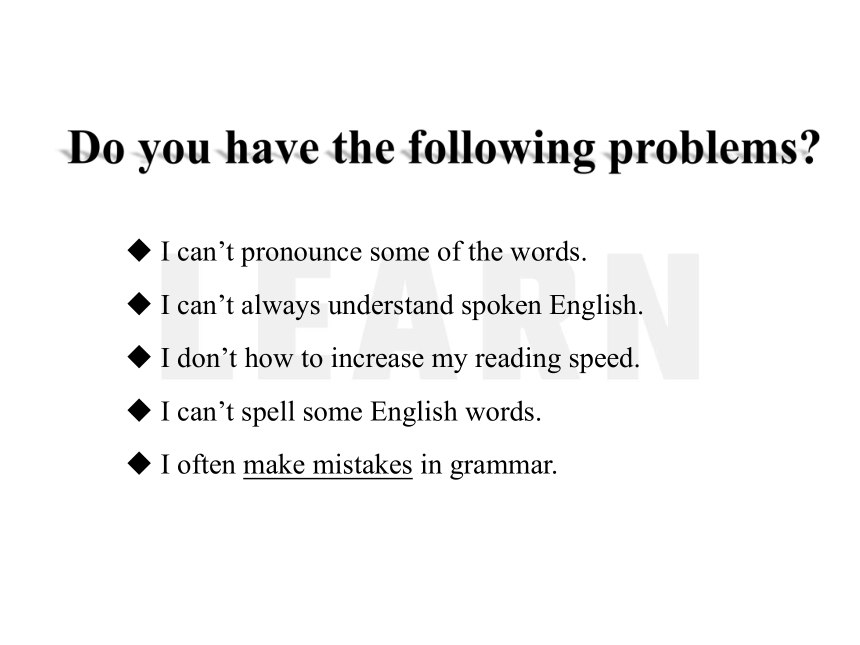
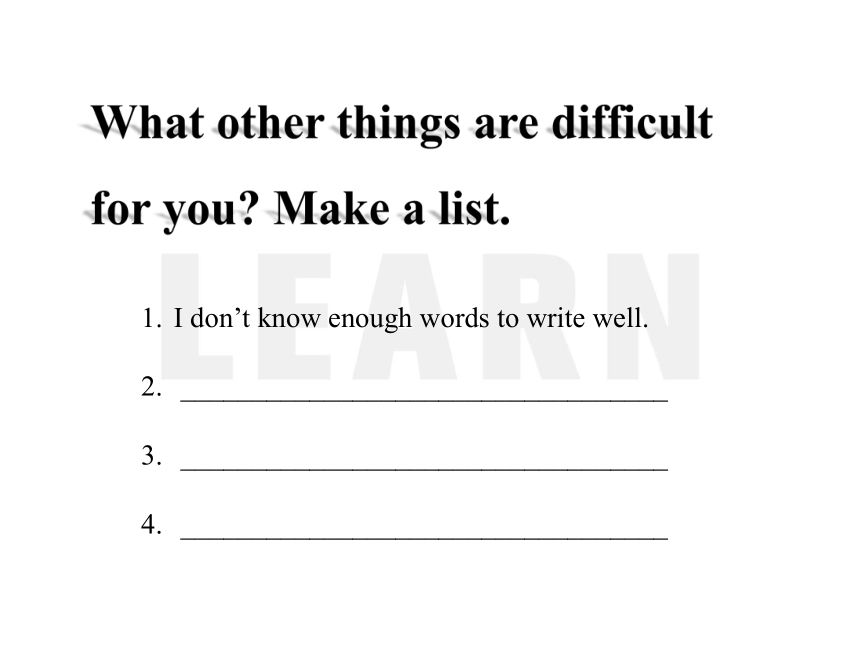

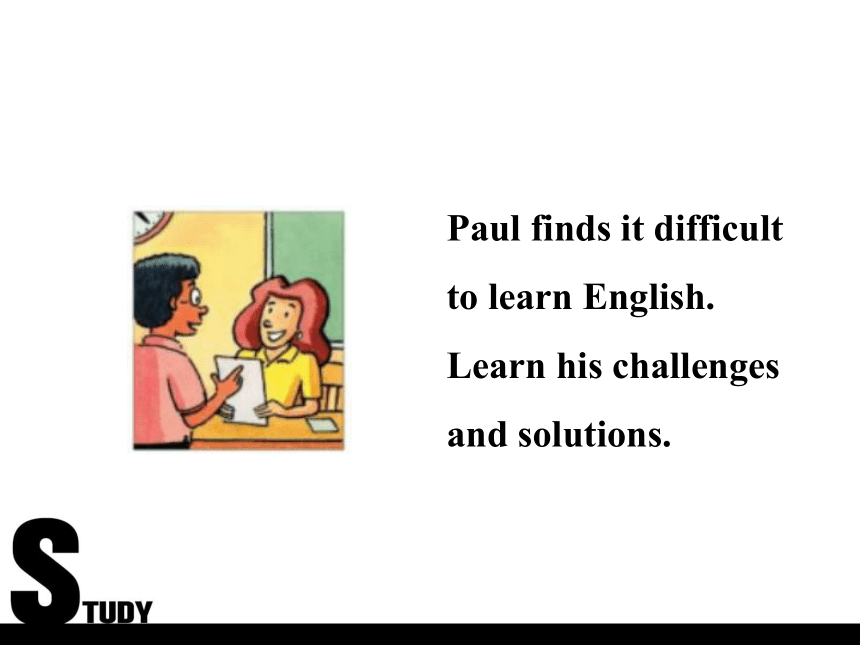
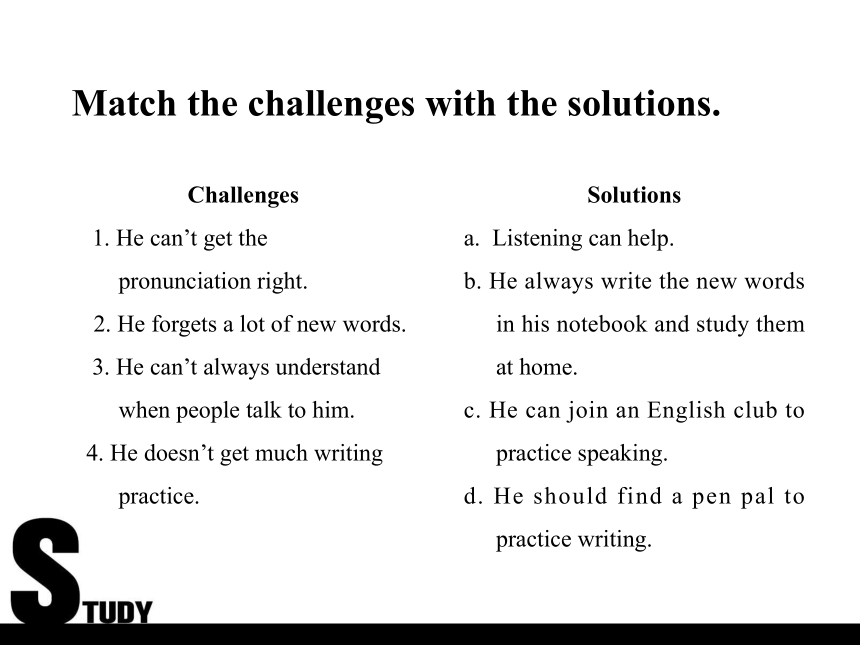
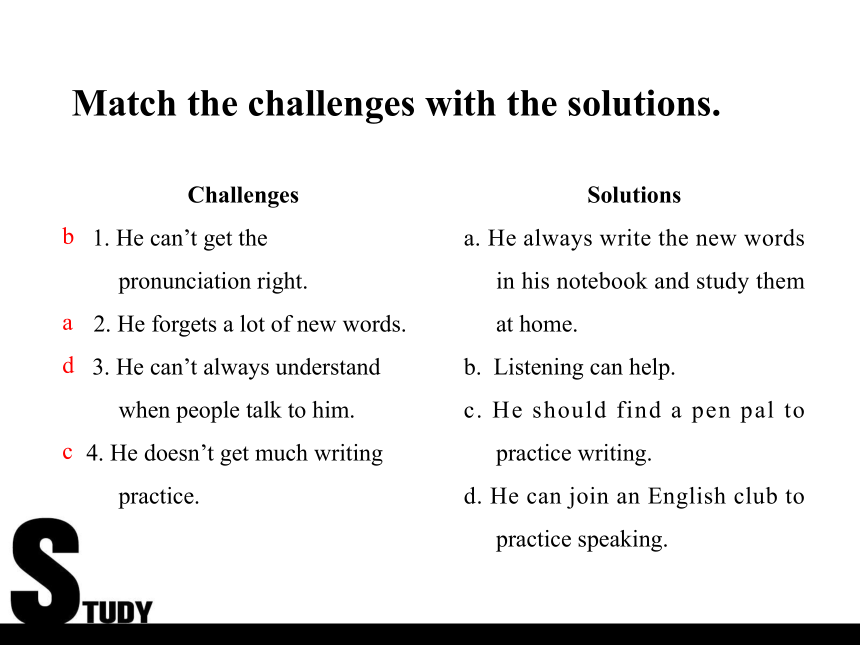
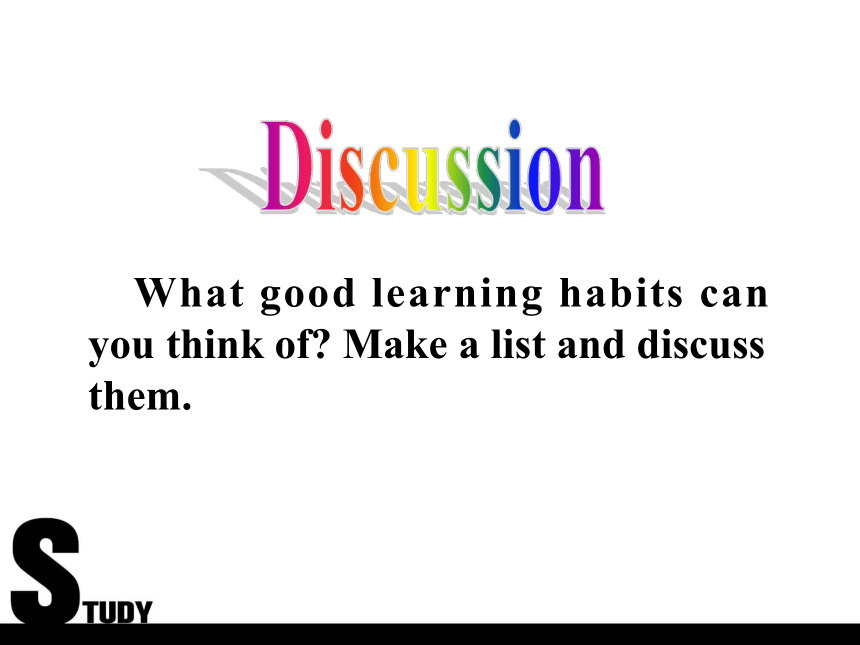
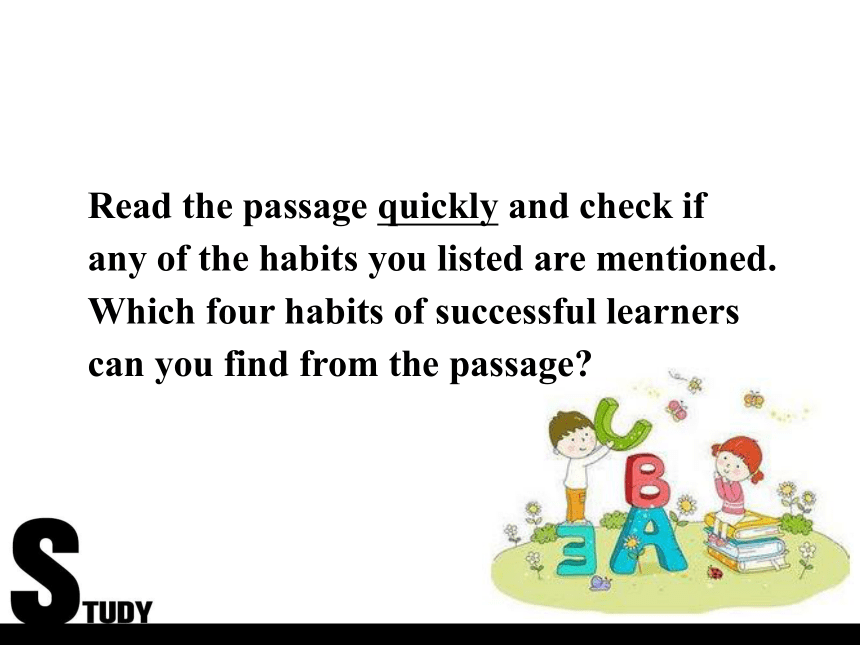
文档简介
(共65张PPT)
初三
Unit 1 How can we become good learns
Section B
Do you have any problems in learning English
Do you have the following problems
I can’t pronounce some of the words.
I can’t always understand spoken English.
I don’t how to increase my reading speed.
I can’t spell some English words.
I often make mistakes in grammar.
What other things are difficult for you Make a list.
I don’t know enough words to write well.
__________________________________
__________________________________
__________________________________
Paul finds it difficult to learn English. Learn his challenges and solutions.
Challenges
1. He can’t get the pronunciation right.
2. He forgets a lot of new words.
3. He can’t always understand when people talk to him.
4. He doesn’t get much writing practice.
Solutions
a. Listening can help.
b. He always write the new words in his notebook and study them at home.
c. He can join an English club to practice speaking.
d. He should find a pen pal to practice writing.
Match the challenges with the solutions.
b
a
d
c
Challenges
1. He can’t get the pronunciation right.
2. He forgets a lot of new words.
3. He can’t always understand when people talk to him.
4. He doesn’t get much writing practice.
Solutions
a. He always write the new words in his notebook and study them at home.
b. Listening can help.
c. He should find a pen pal to practice writing.
d. He can join an English club to practice speaking.
Match the challenges with the solutions.
Discussion
What good learning habits can you think of Make a list and discuss them.
Read the passage quickly and check if any of the habits you listed are mentioned.
Which four habits of successful learners can you find from the passage
How can you become
a successful learner
Everyone is born with the ability to learn. But whether or not you can do it well depends on your learning habits. Research shows that successful learners have some good habits in common.
Creating an interest in what they learn
Studies show that if you are interested in something, your brain is more active and it is also easier for you to pay attention to it for a long time. Good learners often connect what they need to learn with something interesting. For example, if they need to learn English and they like music or sports, they can listen to English songs or watch sports programs in English. This way they will not get bored.
Practicing and learning from mistakes
Good learners think about what they are good at and what they need to practice more. Remember, “Use it or lose it.” Even if you learn something well, you will forget it unless you use it. “Practice makes perfect.” Good learners will keep practicing what they have learned, and they are not afraid of making mistakes. Alexander Graham Bell did not invent the telephone overnight. He succeeded by trying many times and learning from his mistakes.
Developing their study skills
It is not enough to just study hard. Good learners know the best way they can study. For example, they may take notes by writing down key words or by drawing mind maps. They also look for ways to review what they have learned. They may do this by reading their notes every day or by explaining the information to another student.
Asking questions
Good learners often ask questions during or after class. They even ask each other and try to find out the answers. Knowledge comes from questioning.
Learning is a lifelong journey because every day brings something new. Everything that you learn becomes a part of you and changes you, so learn wisely and learn well.
Which four habits of successful learners can you find from the passage
Creating an interest in what they learn, practicing and learning from mistakes, developing their study skills and asking questions.
Read the passage again and answer the questions.
Does the writer think that everyone is born with the ability to learn well Do you agree Why or why not
Why is it a good idea to connect something you need to learn with something you are interested in
What do the sayings “Use it or lose it” and “Practice makes perfect” mean Do you agree with them
4. Do good learners learn from mistakes, or are they afraid of making mistakes
5. What study skills does the writer talk about Do you have those study skills
6. Do you agree that learning is a lifelong journey Why or why not
Does the writer think that everyone is born with the ability to learn well Do you agree Why or why not
2. Why is it a good idea to connect something you need to learn with something you are interested in
No, he doesn’t.
Yes, I do. Because whether or not you can do this well depends on your learning habits.
Because if you are interested in something, your brain is more active and it is also easier for you to pay attention to it for a long time.
3. What do the sayings “Use it or lose it” and “Practice makes perfect” mean Do you agree with them
Even if you learn something well, you will forget it unless you use it. We should keep practicing what we have learned so that we can be good at it.
4. Do good learners learn from mistakes, or are they afraid of making mistakes
They learn from mistakes.
5. What study skills does the writer talk about Do you have those study skills
Taking notes by writing down key words or by drawing mind maps, looking for ways to review what they have learned, and doing this by reading their notes every day or by explaining the information to another student.
6. Do you agree that learning is a lifelong journey Why or why not
Yes. Because every day brings something new.
Look up the following words from
the passage in the dictionary. Then write a sentence for each word.
brain n. connect v. overnight adv.
attention n. review v. knowledge n.
ability n. active adj. wisely adv.
brain: A good way to train the brain is to do some math exercises every day.
Discussion
Do you think you are a good learner
What learning habits do you think are useful Discuss and share your ideas.
Language points
1. be born with
be born意为“出生”,be born with意为“与生俱来,天生”。
如:He was born on April 15th.
He was born with a good memory.
2. depend on
depend on意为“依靠,依赖”,也可以用rely on来替换,根据语境不同也可意为“取决于”,相当于be up to。
如:-- Will you go shopping tomorrow
-- It depends on the weather.
(It’s up to the weather.)
3. in common
意为“共有”,一般会用have something/much/a lot in common来表示“有共同之处”。common除了这个意思以外,还有“普通的”意思。
如:His name was Hansen, a common name in Norway.
4. be interested in …
意为“对…感兴趣”,可转换为have interest in …
区分-ed和-ing结尾的形容词:
-ed:“感到…”,用来描述对某事的感觉
-ing:“令人感到…”,用来描述某物的性质或给人的感觉
类似的还有:
bored 感到无聊的 boring 令人感到无聊的
excited 兴奋的 exciting 令人兴奋的
5. … it is also easier for you to pay attention to it …
比较句型:
It’s + adj. + for sb. to do sth. (adj.修饰 to do sth.)
It’s + adj. + of sb. to do sth. (adj.修饰sb.)
pay attention to… 意为“注意,关注…”,to为介词,所以后面须加名词或动名词。
6. connect… with…
表示与物品的连接、相连,connect后通常用介词to,表示关系方面的联系时,一般用with。
如:Will you connect the wire to the television
He’s connected with our school.
7. for example
意为“例如”,后接句子;such as也能表示“例如”,但是后面须加单词或词组。
8. think about
意为“考虑”,同义词为consider,think over意为“仔细考虑”,可以用think about…carefully来替换 。
9. even if
意为“即使,尽管”,引导让步状语从句,意思与even though相当。
10. unless
意为“除非;如果不”,引导条件状语从句,后接肯定的陈述句,可以转换为if+否定陈述句,若主句为一般将来时,从句要用一般现在时,
如:We will hold the sports meeting if it doesn’t rain tomorrow. (= … unless it rains tomorrow)
11. keep practicing
keep意为“保持”,后接名词或动名词。区分keep sb. from doing sth. 意为“阻止某人做某事”。
12. make mistakes
意为“犯错”,也可以说成make a mistake,表示在某一方面出错时,常与介词in搭配。
13. succeed v.
success n. successful adj.
用法:succeed in doing sth,意为“成功做某事”,也可以用manage to do或be able to do来表示。
14. learn from
意为“从…学到;向…学习”,注意介词搭配。
15. take notes
意为“记笔记”,take的意思比较多,比如take photos中take意为“拍摄”,take medicine中take意为“服用”等。
16. explain the information to another student
explain sth. to sb.意为“向某人解释…”,explain的名词为explanation,注意变化过程中动词中的i要去掉。
17. ask questions
词组中question为名词,意为“问题”,而本段最后的come from questioning的question是动词,意为“问问题;质疑”。
18. find out
意为“找出,查明”,与discover同义。
19. wisely adv. 明智地;聪明地
wise adj. wisdom n.
如:It’s wise of you to bring an umbrella with you.
The Great Wall is the wisdom of ancient Chinese.
一. 单词填写。
1. pronounce(v. ) __________
2. increase(v. &n. ) __________
3. 速度(n. ) __________
4. 搭档; 同伴(n. ) __________
1. pronounce(v. ) __________
2. increase(v. &n. ) __________
3. 速度(n. ) __________
4. 搭档; 同伴(n. ) __________
发音
增加;增长
speed
partner
二. 英汉互译。
1. 犯错; 出错
2. 加入英语俱乐部
3. practice speaking
4. get the pronunciation right
1. 犯错; 出错 make mistakes
2. 加入英语俱乐部 join an English club
3. practice speaking 练习口语
4. get the pronunciation right 正确地发音
三. 句型填词。
1. 我不知道如何提高我的阅读速度。
I don’t know _______ _______ _______my reading speed.
2. 我经常在语法方面出错。
I often _______ _______ _______ grammar.
3.练习说英语时不要害怕出错。
Don’t be afraid to _______ _______ _______ practicing speaking English.
三. 句型填词。
1. 我不知道如何提高我的阅读速度。
I don’t know _______ _______ _______ my reading speed.
2. 我经常在语法方面出错。
I often _______ _______ _______ grammar.
3.练习说英语时不要害怕出错。
Don’t be afraid to _______ _______ _______ practicing speaking English.
how to increase
make mistakes in
make mistakes in
四. 用所给词的适当形式填空。
1. Sometimes, I can’t get the __________ (pronounce) right.
2. I don’t know how __________(improve) my spoken English.
3. The more careful you are, the fewer __________ (mistake) you’ll make.
4. You can find a pen pal to practice __________ (write).
5. She can’t__________ (spell) English words. She often forgets a lot of new words.
1. Sometimes, I can’t get the _____________ (pronounce) right.
2. I don’t know how __________(improve) my spoken English.
3. The more careful you are, the fewer __________ (mistake) you’ll make.
4. You can find a pen pal to practice __________ (write).
5. She can’t__________ (spell) English words. She often forgets a lot of new words.
pronunciation
mistakes
writing
to improve
spell
一. 单项选择。
1. Students should learn how ______ problems.
A. solve B. solving C. can solve D. to solve
2. My friend Bob likes playing football, so he wants ______ a football club.
A. join B. to join
C. to take part D. to take part in
3. She often practices ______ English with her partner.
A. speak B. to speak
C. speaking D. spoken
4. You can ______ your reading speed by doing more reading.
A. increase B. memorize
C. repeat D. discover
5. He often makes mistakes ______ spelling some of words.
A. with B. at C. on D. in
6. -- I often chat with my friends on the Internet.
-- You are so smart! Will you please tell me ______
A. how to do B. how to do it
C. how to use D. when can I use it
二. 根据中文意思完成句子。
1. 对你来说也更容易对它长时间关注。
______ is also ______ for you ______ ______ attention to it for a long time.
2. 即使某些东西你学得很好, 如果你不用它, 你将会忘记它。
Even if you learn something well, you ______ ______ it ______ you use it.
3. 他通过多次尝试并从错误中吸取教训而成功。
He succeeded ______ ______ many times and ______ ______ his mistakes.
三. 句型转换。
1. My brother usually studies English by working with friends. (对划线部分提问)
______ ______ your brother usually study English
2. This boy so young that he can’t do this job. (改为同义句)
This boy is ______ ______ ______ do this job.
四. 汉译英。
1. 我不知道如何提高阅读速度。
2. 我经常犯语法错误。
3. 他会遗忘很多新单词。
参考答案
一. 1. D 2. B 3. C 4. A 5. D 6. B
二. 1. It; easier; to pay 2. will forget; unless
3. by trying; learning from
三. 1. How does 2. too young
四. 1. I don’t know how to increase my reading speed.
2. I often make mistakes in grammar.
3. He forgets a lot of new words.
一些重要的单词和短语;
有关英语学习的好习惯;
文章中重要的知识点。
一. 从方框中选词并用其适当形式填空。
practice, take notes, worry about, develop, prepare
1. I usually ______ in class by writing down key words.
2. They are busy ______ for the school talent show.
3. He is stressed out. He is ______ the final exam.
4. -- Could you give me some advice on how ______ my study skills, Mr. Green
-- Certainly.
5. You can ______ speaking English by having conversations with others.
二. 短语互译。
1. 注意; 关注 pay ______ to
2. 取决于; 依赖 ______ on
3. 例如 ______ example
4. 感到厌烦 get ______
5. be interested in ______
6. connect. . . with ______
7. learn from ______
8. find out ______
9. be born with ______
三. 单项选择。
1. -- I have trouble learning English this term.
-- You should pay more ______ to your teacher’s advice.
A. time B. attention C. use D. heart
2. Learning to write is learning to think. You don’t know things clearly ______ you can write them down.
A. unless B. if C. since D. whether
3. It is important ______ people ______ learn team spirit.
A. of; of B. of; to C. for; to D. to; to
4. If one is ______ in something, his or her brain is more active.
A. interest B. interesting C. interested D. interests
5. You can connect what you need to learn ______ something interesting while learning a language.
A. to B. with C. from D. of
6. Don’t be afraid of making mistakes. Just keep ______ what you’ve learned.
A. practice B. practiced C. practicing D. to practice
四. 完成句子。
1. 人生来就有思考的能力。
Humans ______ ______ ______ the ability to think.
2. 你是否成功常常取决于你努力的程度。
Whether ______ ______ you can succeed usually ______ ______ how hard you work.
3. 对你所学的东西产生兴趣, 那么你就不会感到厌倦。
Creating ______ ______ ______ what you learn, you won’t get bored.
4. 在课堂上, 你可以通过写下关键词来记笔记。
You can take notes ______ ______ ______ key words.
5. 我们的老师要求我们注意书写。
Our teacher asked us to ______ ______ ______ our writing.
参考答案
一. 1. take notes 2. preparing
3. worrying about 4. to develop
5. practice
二. 1. pay attention to 2. depend on
3. for example 4. get bored
5. 对…感兴趣 6. 连接;联系
7. 从…中学习 8. 查明;找出;发现
9. 天生具有
三. 1. B 2. A 3. C 4. C 5. C 6. C
四. 1. are born with 2. or not; depends on
3. an interest in 4. by writing down
5. pay attention to
初三
Unit 1 How can we become good learns
Section B
Do you have any problems in learning English
Do you have the following problems
I can’t pronounce some of the words.
I can’t always understand spoken English.
I don’t how to increase my reading speed.
I can’t spell some English words.
I often make mistakes in grammar.
What other things are difficult for you Make a list.
I don’t know enough words to write well.
__________________________________
__________________________________
__________________________________
Paul finds it difficult to learn English. Learn his challenges and solutions.
Challenges
1. He can’t get the pronunciation right.
2. He forgets a lot of new words.
3. He can’t always understand when people talk to him.
4. He doesn’t get much writing practice.
Solutions
a. Listening can help.
b. He always write the new words in his notebook and study them at home.
c. He can join an English club to practice speaking.
d. He should find a pen pal to practice writing.
Match the challenges with the solutions.
b
a
d
c
Challenges
1. He can’t get the pronunciation right.
2. He forgets a lot of new words.
3. He can’t always understand when people talk to him.
4. He doesn’t get much writing practice.
Solutions
a. He always write the new words in his notebook and study them at home.
b. Listening can help.
c. He should find a pen pal to practice writing.
d. He can join an English club to practice speaking.
Match the challenges with the solutions.
Discussion
What good learning habits can you think of Make a list and discuss them.
Read the passage quickly and check if any of the habits you listed are mentioned.
Which four habits of successful learners can you find from the passage
How can you become
a successful learner
Everyone is born with the ability to learn. But whether or not you can do it well depends on your learning habits. Research shows that successful learners have some good habits in common.
Creating an interest in what they learn
Studies show that if you are interested in something, your brain is more active and it is also easier for you to pay attention to it for a long time. Good learners often connect what they need to learn with something interesting. For example, if they need to learn English and they like music or sports, they can listen to English songs or watch sports programs in English. This way they will not get bored.
Practicing and learning from mistakes
Good learners think about what they are good at and what they need to practice more. Remember, “Use it or lose it.” Even if you learn something well, you will forget it unless you use it. “Practice makes perfect.” Good learners will keep practicing what they have learned, and they are not afraid of making mistakes. Alexander Graham Bell did not invent the telephone overnight. He succeeded by trying many times and learning from his mistakes.
Developing their study skills
It is not enough to just study hard. Good learners know the best way they can study. For example, they may take notes by writing down key words or by drawing mind maps. They also look for ways to review what they have learned. They may do this by reading their notes every day or by explaining the information to another student.
Asking questions
Good learners often ask questions during or after class. They even ask each other and try to find out the answers. Knowledge comes from questioning.
Learning is a lifelong journey because every day brings something new. Everything that you learn becomes a part of you and changes you, so learn wisely and learn well.
Which four habits of successful learners can you find from the passage
Creating an interest in what they learn, practicing and learning from mistakes, developing their study skills and asking questions.
Read the passage again and answer the questions.
Does the writer think that everyone is born with the ability to learn well Do you agree Why or why not
Why is it a good idea to connect something you need to learn with something you are interested in
What do the sayings “Use it or lose it” and “Practice makes perfect” mean Do you agree with them
4. Do good learners learn from mistakes, or are they afraid of making mistakes
5. What study skills does the writer talk about Do you have those study skills
6. Do you agree that learning is a lifelong journey Why or why not
Does the writer think that everyone is born with the ability to learn well Do you agree Why or why not
2. Why is it a good idea to connect something you need to learn with something you are interested in
No, he doesn’t.
Yes, I do. Because whether or not you can do this well depends on your learning habits.
Because if you are interested in something, your brain is more active and it is also easier for you to pay attention to it for a long time.
3. What do the sayings “Use it or lose it” and “Practice makes perfect” mean Do you agree with them
Even if you learn something well, you will forget it unless you use it. We should keep practicing what we have learned so that we can be good at it.
4. Do good learners learn from mistakes, or are they afraid of making mistakes
They learn from mistakes.
5. What study skills does the writer talk about Do you have those study skills
Taking notes by writing down key words or by drawing mind maps, looking for ways to review what they have learned, and doing this by reading their notes every day or by explaining the information to another student.
6. Do you agree that learning is a lifelong journey Why or why not
Yes. Because every day brings something new.
Look up the following words from
the passage in the dictionary. Then write a sentence for each word.
brain n. connect v. overnight adv.
attention n. review v. knowledge n.
ability n. active adj. wisely adv.
brain: A good way to train the brain is to do some math exercises every day.
Discussion
Do you think you are a good learner
What learning habits do you think are useful Discuss and share your ideas.
Language points
1. be born with
be born意为“出生”,be born with意为“与生俱来,天生”。
如:He was born on April 15th.
He was born with a good memory.
2. depend on
depend on意为“依靠,依赖”,也可以用rely on来替换,根据语境不同也可意为“取决于”,相当于be up to。
如:-- Will you go shopping tomorrow
-- It depends on the weather.
(It’s up to the weather.)
3. in common
意为“共有”,一般会用have something/much/a lot in common来表示“有共同之处”。common除了这个意思以外,还有“普通的”意思。
如:His name was Hansen, a common name in Norway.
4. be interested in …
意为“对…感兴趣”,可转换为have interest in …
区分-ed和-ing结尾的形容词:
-ed:“感到…”,用来描述对某事的感觉
-ing:“令人感到…”,用来描述某物的性质或给人的感觉
类似的还有:
bored 感到无聊的 boring 令人感到无聊的
excited 兴奋的 exciting 令人兴奋的
5. … it is also easier for you to pay attention to it …
比较句型:
It’s + adj. + for sb. to do sth. (adj.修饰 to do sth.)
It’s + adj. + of sb. to do sth. (adj.修饰sb.)
pay attention to… 意为“注意,关注…”,to为介词,所以后面须加名词或动名词。
6. connect… with…
表示与物品的连接、相连,connect后通常用介词to,表示关系方面的联系时,一般用with。
如:Will you connect the wire to the television
He’s connected with our school.
7. for example
意为“例如”,后接句子;such as也能表示“例如”,但是后面须加单词或词组。
8. think about
意为“考虑”,同义词为consider,think over意为“仔细考虑”,可以用think about…carefully来替换 。
9. even if
意为“即使,尽管”,引导让步状语从句,意思与even though相当。
10. unless
意为“除非;如果不”,引导条件状语从句,后接肯定的陈述句,可以转换为if+否定陈述句,若主句为一般将来时,从句要用一般现在时,
如:We will hold the sports meeting if it doesn’t rain tomorrow. (= … unless it rains tomorrow)
11. keep practicing
keep意为“保持”,后接名词或动名词。区分keep sb. from doing sth. 意为“阻止某人做某事”。
12. make mistakes
意为“犯错”,也可以说成make a mistake,表示在某一方面出错时,常与介词in搭配。
13. succeed v.
success n. successful adj.
用法:succeed in doing sth,意为“成功做某事”,也可以用manage to do或be able to do来表示。
14. learn from
意为“从…学到;向…学习”,注意介词搭配。
15. take notes
意为“记笔记”,take的意思比较多,比如take photos中take意为“拍摄”,take medicine中take意为“服用”等。
16. explain the information to another student
explain sth. to sb.意为“向某人解释…”,explain的名词为explanation,注意变化过程中动词中的i要去掉。
17. ask questions
词组中question为名词,意为“问题”,而本段最后的come from questioning的question是动词,意为“问问题;质疑”。
18. find out
意为“找出,查明”,与discover同义。
19. wisely adv. 明智地;聪明地
wise adj. wisdom n.
如:It’s wise of you to bring an umbrella with you.
The Great Wall is the wisdom of ancient Chinese.
一. 单词填写。
1. pronounce(v. ) __________
2. increase(v. &n. ) __________
3. 速度(n. ) __________
4. 搭档; 同伴(n. ) __________
1. pronounce(v. ) __________
2. increase(v. &n. ) __________
3. 速度(n. ) __________
4. 搭档; 同伴(n. ) __________
发音
增加;增长
speed
partner
二. 英汉互译。
1. 犯错; 出错
2. 加入英语俱乐部
3. practice speaking
4. get the pronunciation right
1. 犯错; 出错 make mistakes
2. 加入英语俱乐部 join an English club
3. practice speaking 练习口语
4. get the pronunciation right 正确地发音
三. 句型填词。
1. 我不知道如何提高我的阅读速度。
I don’t know _______ _______ _______my reading speed.
2. 我经常在语法方面出错。
I often _______ _______ _______ grammar.
3.练习说英语时不要害怕出错。
Don’t be afraid to _______ _______ _______ practicing speaking English.
三. 句型填词。
1. 我不知道如何提高我的阅读速度。
I don’t know _______ _______ _______ my reading speed.
2. 我经常在语法方面出错。
I often _______ _______ _______ grammar.
3.练习说英语时不要害怕出错。
Don’t be afraid to _______ _______ _______ practicing speaking English.
how to increase
make mistakes in
make mistakes in
四. 用所给词的适当形式填空。
1. Sometimes, I can’t get the __________ (pronounce) right.
2. I don’t know how __________(improve) my spoken English.
3. The more careful you are, the fewer __________ (mistake) you’ll make.
4. You can find a pen pal to practice __________ (write).
5. She can’t__________ (spell) English words. She often forgets a lot of new words.
1. Sometimes, I can’t get the _____________ (pronounce) right.
2. I don’t know how __________(improve) my spoken English.
3. The more careful you are, the fewer __________ (mistake) you’ll make.
4. You can find a pen pal to practice __________ (write).
5. She can’t__________ (spell) English words. She often forgets a lot of new words.
pronunciation
mistakes
writing
to improve
spell
一. 单项选择。
1. Students should learn how ______ problems.
A. solve B. solving C. can solve D. to solve
2. My friend Bob likes playing football, so he wants ______ a football club.
A. join B. to join
C. to take part D. to take part in
3. She often practices ______ English with her partner.
A. speak B. to speak
C. speaking D. spoken
4. You can ______ your reading speed by doing more reading.
A. increase B. memorize
C. repeat D. discover
5. He often makes mistakes ______ spelling some of words.
A. with B. at C. on D. in
6. -- I often chat with my friends on the Internet.
-- You are so smart! Will you please tell me ______
A. how to do B. how to do it
C. how to use D. when can I use it
二. 根据中文意思完成句子。
1. 对你来说也更容易对它长时间关注。
______ is also ______ for you ______ ______ attention to it for a long time.
2. 即使某些东西你学得很好, 如果你不用它, 你将会忘记它。
Even if you learn something well, you ______ ______ it ______ you use it.
3. 他通过多次尝试并从错误中吸取教训而成功。
He succeeded ______ ______ many times and ______ ______ his mistakes.
三. 句型转换。
1. My brother usually studies English by working with friends. (对划线部分提问)
______ ______ your brother usually study English
2. This boy so young that he can’t do this job. (改为同义句)
This boy is ______ ______ ______ do this job.
四. 汉译英。
1. 我不知道如何提高阅读速度。
2. 我经常犯语法错误。
3. 他会遗忘很多新单词。
参考答案
一. 1. D 2. B 3. C 4. A 5. D 6. B
二. 1. It; easier; to pay 2. will forget; unless
3. by trying; learning from
三. 1. How does 2. too young
四. 1. I don’t know how to increase my reading speed.
2. I often make mistakes in grammar.
3. He forgets a lot of new words.
一些重要的单词和短语;
有关英语学习的好习惯;
文章中重要的知识点。
一. 从方框中选词并用其适当形式填空。
practice, take notes, worry about, develop, prepare
1. I usually ______ in class by writing down key words.
2. They are busy ______ for the school talent show.
3. He is stressed out. He is ______ the final exam.
4. -- Could you give me some advice on how ______ my study skills, Mr. Green
-- Certainly.
5. You can ______ speaking English by having conversations with others.
二. 短语互译。
1. 注意; 关注 pay ______ to
2. 取决于; 依赖 ______ on
3. 例如 ______ example
4. 感到厌烦 get ______
5. be interested in ______
6. connect. . . with ______
7. learn from ______
8. find out ______
9. be born with ______
三. 单项选择。
1. -- I have trouble learning English this term.
-- You should pay more ______ to your teacher’s advice.
A. time B. attention C. use D. heart
2. Learning to write is learning to think. You don’t know things clearly ______ you can write them down.
A. unless B. if C. since D. whether
3. It is important ______ people ______ learn team spirit.
A. of; of B. of; to C. for; to D. to; to
4. If one is ______ in something, his or her brain is more active.
A. interest B. interesting C. interested D. interests
5. You can connect what you need to learn ______ something interesting while learning a language.
A. to B. with C. from D. of
6. Don’t be afraid of making mistakes. Just keep ______ what you’ve learned.
A. practice B. practiced C. practicing D. to practice
四. 完成句子。
1. 人生来就有思考的能力。
Humans ______ ______ ______ the ability to think.
2. 你是否成功常常取决于你努力的程度。
Whether ______ ______ you can succeed usually ______ ______ how hard you work.
3. 对你所学的东西产生兴趣, 那么你就不会感到厌倦。
Creating ______ ______ ______ what you learn, you won’t get bored.
4. 在课堂上, 你可以通过写下关键词来记笔记。
You can take notes ______ ______ ______ key words.
5. 我们的老师要求我们注意书写。
Our teacher asked us to ______ ______ ______ our writing.
参考答案
一. 1. take notes 2. preparing
3. worrying about 4. to develop
5. practice
二. 1. pay attention to 2. depend on
3. for example 4. get bored
5. 对…感兴趣 6. 连接;联系
7. 从…中学习 8. 查明;找出;发现
9. 天生具有
三. 1. B 2. A 3. C 4. C 5. C 6. C
四. 1. are born with 2. or not; depends on
3. an interest in 4. by writing down
5. pay attention to
同课章节目录
- Unit 1 How can we become good learners.
- Section A
- Section B
- Unit 2 I think that mooncakes are delicious!
- Section A
- Section B
- Unit 3 Could you please tell me where the restroom
- Section A
- Section B
- Unit 4 I used to be afraid of the dark.
- Section A
- Section B
- Unit 5 What are the shirts made of?
- Section A
- Section B
- Review of Units 1-5
- Unit 6 When was it invented?
- Section A
- Section B
- Unit 7 Teenagers should be allowed to choose their
- Section A
- Section B
- Unit 8 It must belong to Carla.
- Section A
- Section B
- Unit 9 I like music that I can dance to.
- Section A
- Section B
- Unit 10 You're supposed to shake hands.
- Section A
- Section B
- Review of Units 6-10
- Unit 11 Sad movies make me cry.
- Section A
- Section B
- Unit 12 Life is full of the unexpected
- Section A
- Section B
- Unit 13 We're trying to save the earth!
- Section A
- Section B
- Unit 14 I remember meeting all of you in Grade 7.
- Section A
- Section B
- Review of Units 11-14
